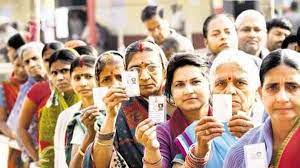India is one of the world’s largest democracies, with a population of over 1.3 billion people. Elections are an essential part of the Indian political process, and they are held at regular intervals to elect leaders who govern the country. In this article, we will discuss the elections in India, their significance, and the process involved.

Table of Contents
Significance of Elections in India
Elections in India are significant because they determine who will lead the country and govern its citizens. They are an essential aspect of democracy, which allows citizens to choose their leaders. India is a federal democracy, with power divided between the central government and the state governments. Elections are held at the national, state, and local levels, with each level having its own election process.
The Process of Elections in India
The Election Commission of India is responsible for conducting elections in the country.
- Preparation: The Election Commission of India prepares for the elections by announcing the dates and creating a schedule for the elections. It also sets up polling stations and arranges for the necessary equipment and materials.
- Nomination of Candidates: Political parties nominate candidates for the elections. The candidates must be Indian citizens and meet the age and education criteria set by the Election Commission of India.
- Campaigning: Political parties campaign for their candidates by holding rallies, organizing public meetings, and advertising through various media channels.
- Voting: On the day of the election, eligible citizens go to their designated polling station and vote for their preferred candidate. The voting is done using electronic voting machines (EVMs) or ballot papers.
- Counting: After the voting is completed, the Election Commission of India counts the votes and declares the winners.
The Role of Political Parties in Elections
Political parties play a significant role and they nominate candidates and campaign for them by highlighting their achievements and criticizing their opponents. Political parties also make election promises and present their vision for the future of the country.
The major political parties in India are the Bharatiya Janata Party (BJP), the Indian National Congress (INC), and the Aam Aadmi Party (AAP), among others.
Conclusion
In conclusion, elections are an essential part of the Indian political process. They provide citizens with an opportunity to choose their leaders and determine the direction of the country. The process of elections in India is robust and involves multiple steps, from preparation to campaigning and voting. Political parties play a crucial role in elections by nominating candidates and campaigning for them. The Election Commission of India is responsible for conducting free and fair elections and ensuring that the process is transparent and impartial.
Important Links